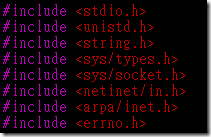執行程式時, 若遇到
./update_item: error while loading shared libraries: libsqlrclientwrapper-0.40.so.1: cannot open shared object file: No such file or directory
像這樣的錯誤訊息 , 表示程式中所需的 so 檔(share library) 沒找到 , 要修改 /etc/ld.so.conf 加上這個目錄 , 改完要下 ldconfig –v 讓路徑生效
可以用 ldd 看該程式所使用到的 shared library 有那些, 及 lib 路徑
—–
以下是 gentoo 的標準解法 , 其他版本的 linux 則不太相同!!
cat /etc/ld.so.conf 這個檔是由 env-update 產生的 , 所以再繼續看一下 /etc/env.d 下 , 究竟有啥
# ld.so.conf autogenerated by env-update; make all changes to
# contents of /etc/env.d directory
/usr/local/lib
/usr/i686-pc-linux-gnu/lib
/usr/lib/gcc/i686-pc-linux-gnu/4.1.2
/usr/lib/gcc/i686-pc-linux-gnu/4.1.1
/usr/local/firstworks/lib
參考資料, 這是 compile sqlrelay 列出來的 information
See any operating system documentation about shared libraries for
more information, such as the ld(1) and ld.so(8) manual pages.
———————————————————————-
/bin/sh ../../libtool –mode=finish /usr/local/firstworks/lib
PATH=”$PATH:/sbin” ldconfig -n /usr/local/firstworks/lib
———————————————————————-
Libraries have been installed in:
/usr/local/firstworks/lib
If you ever happen to want to link against installed libraries
in a given directory, LIBDIR, you must either use libtool, and
specify the full pathname of the library, or use the `-LLIBDIR’
flag during linking and do at least one of the following:
– add LIBDIR to the `LD_LIBRARY_PATH’ environment variable
during execution
– add LIBDIR to the `LD_RUN_PATH’ environment variable
during linking
– use the `-Wl,–rpath -Wl,LIBDIR’ linker flag
– have your system administrator add LIBDIR to `/etc/ld.so.conf’
在 /etc/env.d 下建立一個 90sqlrelay
內容是
LDPATH="/usr/local/firstworks/lib"
再run : env-update , 就看到 /etc/ld.so.conf 多了正確的 lib path 了
// ———————–
[12/6/13 下午4:37:54] RUTEN AA: 到 /usr/lib 找出原生的 .so 檔,應該會是 libsqlrclientwrapper-0.40.so.xxx.xxx
[12/6/13 下午4:38:13] RUTEN AA: ln -s libsqlrclientwrapper-0.40.so.xxx.xxx 到 loss 的 libsqlrclientwrapper-0.40.so.1.0.0
[12/6/13 下午4:38:17] RUTEN AA: 再 ldconfig
[12/6/13 下午4:40:53] RUTEN AA: 可以用 ldconfig -p 看是不是已經把 libsqlrclientwrapper-0.40.so.1 給 load 進來了
